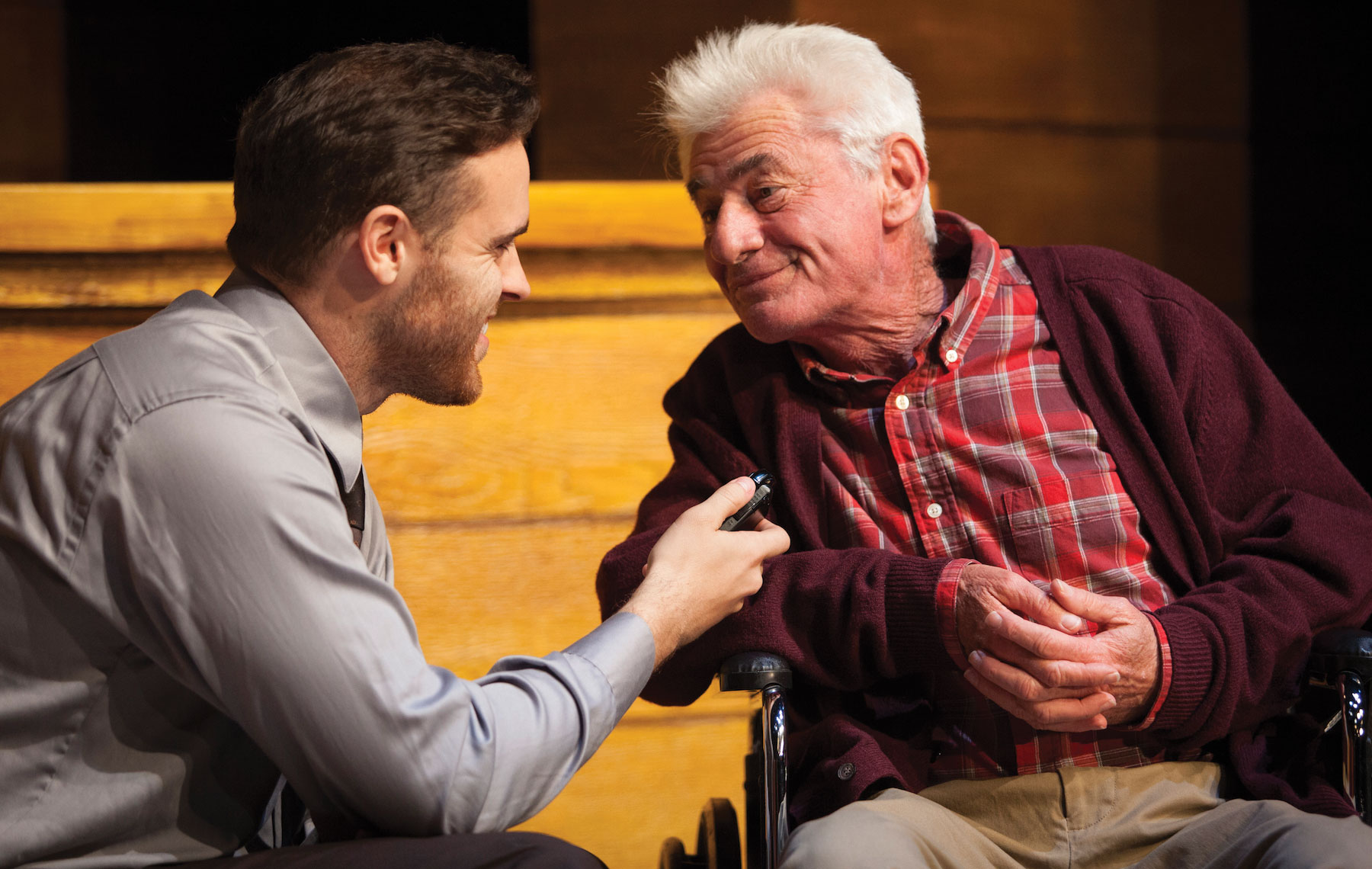 Jackson Kendall (left) and Larry Eisenberg in “Tuesdays With Morrie”. Photo by Gina Long
Jackson Kendall (left) and Larry Eisenberg in “Tuesdays With Morrie”. Photo by Gina Long “Tuesdays With Morrie,” Mitch Albom’s memoir about his relationship with his college professor Morrie Schwartz, was published in 1997 and became a worldwide best-seller. Two years later, it was made into a TV movie starring Hank Azaria and Jack Lemmon, who won an Emmy Award for his performance. Adapted for the stage by Albom and Jeffrey Hatcher, it debuted off-Broadway in 2002. On Feb. 22, the emotional play about life, loss and the bonds of friendship comes to the Sierra Madre Playhouse in a production starring Jackson Kendall as Mitch and Larry Eisenberg as Morrie.
The story focuses on Mitch, an aspiring jazz musician who has a close relationship with Morrie, his sociology professor at Brandeis University. Mitch vows to keep in touch after graduation but breaks that promise amid the pressures of a demanding career as a sports journalist. Years later, when he sees a “Nightline” report featuring Morrie, now terminally ill with Lou Gehrig’s disease (ALS), he seeks out his mentor and finds that he can still learn valuable lessons from him.
“I think anyone who has dealt with losing a loved one will relate to it in some way. The audience brings their own experience,” director L. Flint Esquerra told the Journal after a rehearsal of the play.
“This play is so well known and has the reputation for being a very inspiring piece,” Esquerra said. “We really strived to keep it honest and let the humanity come through.”
Unlike Albom, Kendall was raised Roman Catholic and doesn’t understand any of the Yiddish phrases that Morrie uses in the play. He also hasn’t experienced the kind of life pressures or loss that Albom had dealt with at the time.
“He’s 37 [when he meets with Morrie] and I’m 27,” Kendall said. “I’m not married and don’t have kids. While I’ve lost people who are important to me, Mitch has only had two people in his life who have pushed him to pursue his passion — Morrie and his uncle. He has lost one and he’s losing the other. [In portraying] that world, the last thing you want to be is phony. The depth of loss has to be real and that’s a very hard thing to do.”
Kendall said he was “vaguely” familiar with the story but hadn’t seen the TV movie and avoided watching it, reading the book or watching Albom’s lectures “because I didn’t want to do an impression,” he said.
For Eisenberg, 72, the theme of loss hits much closer to home. His father, a man he described as having been “a vibrant and powerful man,” is now in an assisted living home. “Witnessing his aging, deterioration, mental loss, it’s been the theme for me in the last few years,” Eisenberg said. But as the son of Polish-Jewish Holocaust survivors born in a displaced persons camp, he and his family experienced loss long before.
“My mother was 12 years old when she went to Buchenwald and came out when she was 16. She lost her entire family. My father escaped from a train going to Auschwitz,” he said of his parents, Orthodox Jews who settled in Brooklyn after World War II, then moved to New Jersey. Eisenberg characterizes himself as an “atheist, the cliché cultural Jew. I was bar mitzvahed, but it had nothing to do with God. It was to honor my parents and the sense of tribe that was very important to me.”
Eisenberg finds it challenging to portray Morrie’s physical deterioration believably and still make himself heard to the audience, but other aspects of the character come easily. “I’ve been preparing my whole life to play an old Jew, and here I am. It’s all very familiar to me,” he said. “One of the things that draws me to this play is it’s filled with a lot of Yiddishkayt. Yiddish is my first language and I’ve done a lot of professional work where the text is in Yiddish. I’m very comfortable with it.”
Playing Morrie made Eisenberg realize that he’s “getting better, not diminishing. What I’ve learned from Morrie is that I’m better now than I’ve ever been before and that every obstacle that I have is one more tool for me to use as a performer,” he said. “I now have more to express and my ability to perform has been enhanced by all the obstacles.”
Esquerra said of the production, “I hope audiences take away a new perspective on how to live life. Morrie says amazing things because of his awareness of his mortality.”
“There are so many life lessons packed into this about humanity and relationships and forgiveness,” Kendall said. “If you come see the show and feel something, whatever it is, I’m happy.”
“Tuesdays With Morrie” runs Feb. 22-March 31 at the Sierra Madre Playhouse.





















 More news and opinions than at a Shabbat dinner, right in your inbox.
More news and opinions than at a Shabbat dinner, right in your inbox.